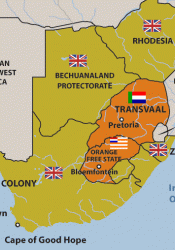1899-1902 Anglo-Boer War
In October of 1899 a war broke out in South Africa. The war would become known as the Anglo-Boer war. Oddly enough the war would frequently be called “The White Man’s War,” because the natives in the region had nothing to do with the conflict. The parties involved were Great Britain and its colonized regions (Canada, Australia, and New Zealand) and two former British republics; the Free Orange State and Transvaal. The people in this region were called the Boer people and primarily consisted of Danish farmers who settled in the area in the 17th century. The Boers were very independent and essentially cut themselves off from mainland Europe. By 1850 the Boers subdivided into the Free Orange State and Transvaal. Relations between the Boer states and other British colonies were not good before the war began but the primary conflict that led to war in 1899 was over the control of the Transvaal gold fields in the Boer region. As more gold was found, an increasing number of ‘Uitlanders’ (foreigners) moved to the region. British representatives wished that the foreigners, primarily Europeans, would have the immediate right to vote in Transvaal elections. The British Empire saw this as a way to win back the separating territory and a good amount of gold. The Transvaal representative disagreed and war broke out in the area as British soldiers would not leave the area as requested by the Transvaals.
The Anglo-Boer war is commonly known as Britain's Vietnam due to the Empire’s underestimation of the Boer peoples fighting ability. The British thought that the war would only last for a week, yet in fact the war lasted for over two years and thousands of people lost their lives, just like in the Vietnam war. Unfortunately the African natives, who had little to no involvement in the war, suffered thousands of casualties as they were forced into concentration camps by the British. The Anglo-Boer war was a tragic war, not only did the Boers lose their independence from the British, they also lost thousands of women and children from the camps. The war destroyed Boer towns and farms, but most catastrophic was the destruction of the Boer way of life.
Works Cited:
Canadian War Museum, Jerome Foldes-Busque. “Canada and the South African War, 1899-1902.” WarMuseum.ca - South African War - Boer War Maps, Canadian War Museum, www.warmuseum.ca/cwm/exhibitions/boer/boerwarmaps_e.html.
“Case Name: Anglo-Boer: Britain's Vietnam .” Class\Work\Boerwar, American University of Washington D.C Trade Environment Projects, 27 Oct. 2016, web.archive.org/web/20161027014601/www1.american.edu/ted/ice/boerwar.htm.

